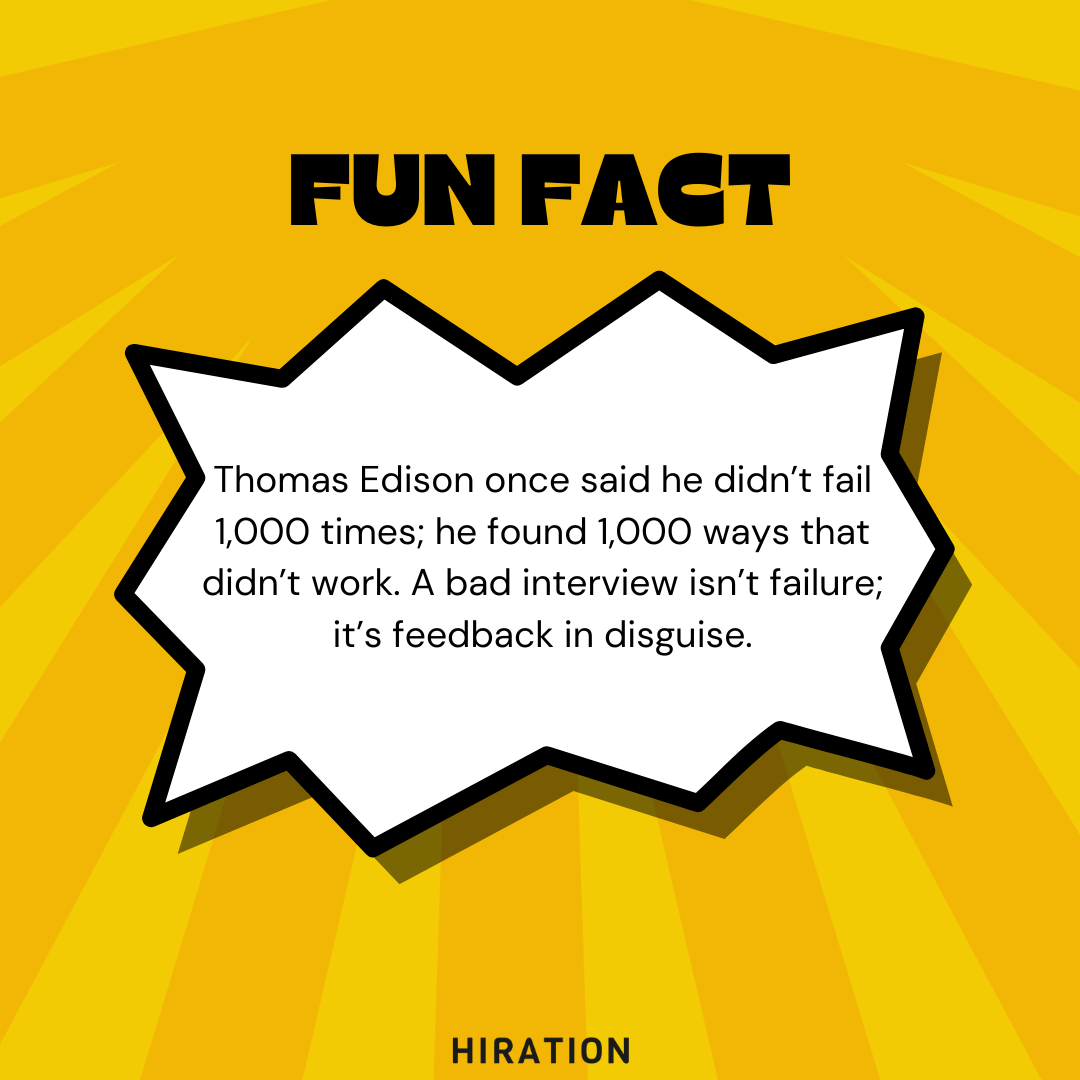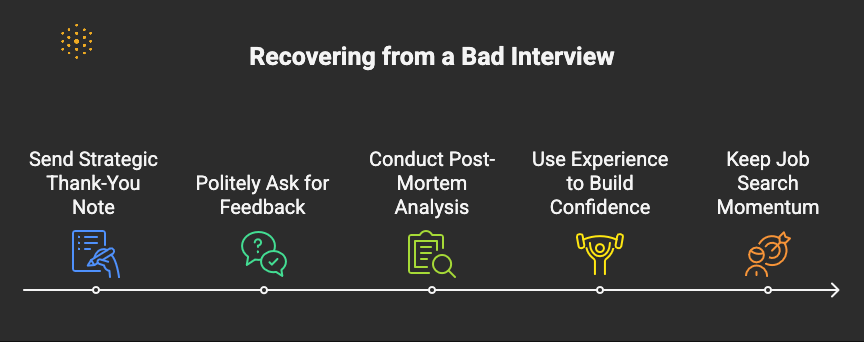What should someone do after a bad interview to recover and improve?
Send a brief thank-you to clarify missteps; if rejected, politely request feedback. Analyze weak spots, practice with structured methods, rebuild confidence, and maintain momentum by refining materials and applying to new roles.
We’ve all been there - that sinking feeling after a bad interview where every awkward pause and missed answer replays on loop.
And you're not imagining it - 73% of job seekers say searching for a job is one of the most stressful experiences of their lives.
And while that pressure can feel like the end of the world, it's actually a valuable turning point that you can turn into a learning experience and come back stronger.
In this guide, you'll discover 5 strategic steps to transform a disappointing experience into your next career springboard, rebuilding confidence, refining skills, and igniting momentum.
Let’s turn setbacks into comebacks.
1. Send a Strategic Thank-You Note
This might feel like the last thing you want to do, but sending a thank-you note is crucial, especially after a rough interview.
It shows professionalism and gives you a rare second chance to make a good impression.
More importantly, it’s a strategic tool. You can use it to briefly and gracefully correct or clarify a point you fumbled.
For instance, if you blanked on a technical question, you can write, "After further reflection on your question about X, I wanted to add..."
This small gesture can subtly reframe the narrative and help the interviewer remember you for the right reasons.
2. Politely Ask for Feedback (If You Get Rejected)
This is a step most candidates skip, but it can provide invaluable information.
If you receive a rejection email, responding to it by politely asking for feedback can set you apart and give you concrete areas for improvement.
It demonstrates maturity and a commitment to professional growth, which can leave a lasting positive impression.
However, many companies have policies against providing specific feedback to avoid potential legal issues. So, a response is a bonus, not a guarantee.
The key is to be humble and appreciative, not demanding. You can use this email template to ask for feedback:
Subject: Re: Your decision regarding the [Job Title] position
Dear [Hiring Manager/Recruiter Name],
Thank you for letting me know your decision. While I'm disappointed, I truly appreciate the opportunity to have interviewed for the role and learned more about your team.
If you have a moment, would you be willing to share any brief feedback on my interview that might help me in my future job search?
Any insights you could provide would be incredibly valuable.
I wish you and [Company Name] all the best in finding the right candidate.
Best regards,
[Your Name]

3. Conduct a 'Post-Mortem' Analysis
Now it’s time to switch from emotional reflection to logical analysis. Look at the interview as data.
Grab a notebook and ask yourself:
- Which questions did I answer confidently?
- Which questions made me stumble? Was it a technical question, a question about my experience, or one of the classic "tell me about yourself" prompts?
- Were there any behavioral interview questions that I wasn't prepared for?
- Did I struggle to structure my answers?
If you had trouble with situational questions, practicing the STAR method for interviews can be a game-changer.
By identifying the exact weak spots, you create a clear roadmap for what to practice next.
4. Use the Experience to Build Confidence
A bad interview can shatter your self-esteem, but the preparation you do afterward can build it back up, making you even stronger for the next round.
Now that you've analyzed what went wrong, you can practice until those weaknesses become strengths.
For example, if you struggled to answer, "What are your weaknesses?," spend time crafting an authentic and strategic response. If you felt nervous, work on techniques to stay calm.
Confidence isn't something you have; it's something you build. And there's no better way to build it than by conquering something you previously found difficult.
Learning how to be confident in an interview is a skill that comes from solid preparation.
5. Keep Your Job Search Momentum
Finally, don't let one bad experience stop you in your tracks. It's easy to think, "If I failed this one, I'll fail the next one too." This is a cognitive trap.
Remember, a bad interview experience can also be a red flag about the company. An unprepared interviewer, a disorganized process, or a disrespectful tone often says more about the company culture than it does about your abilities.
The single best way to get over a bad interview is to land another one. Keep refining your resume, tailoring your cover letters, and submitting applications.
Every interview, good or bad, is a step forward if you choose to learn from it.
Pro Tip: Apply for at least two or three new jobs within 24 hours of the bad interview. This act of moving forward helps shift your mindset from a place of defeat to a place of action and opportunity.

Final Thoughts
A bad interview doesn’t define your potential, it reveals where you can grow.
By taking a few intentional steps after the fact like sending a thoughtful thank-you, seeking feedback, and reflecting on your performance, you transform disappointment into momentum.
Every tough interview is a chance to sharpen your edge for the next one.
If you’re ready to bounce back stronger, Hiration can help.
From AI-powered mock interviews to resume reviews tailored to your dream role, our platform equips you to walk into your next interview with confidence, and walk out with an offer.
Remember: every setback is just setup for a stronger comeback. You've got this!
Frequently Asked Questions
-
What should you do after a bad interview?
Start with 5 steps: send a thank-you note, politely ask for feedback, conduct a post-mortem analysis, use the experience to build confidence, and keep your job search momentum.
-
Should you send a thank-you note after a bad interview?
Yes. Sending a thank-you note shows professionalism, offers a second chance to make a good impression, and lets you briefly correct or clarify a point you fumbled.
-
How do you ask for feedback after a rejection?
Reply to the rejection email with a humble, appreciative request for brief feedback on your interview, knowing many companies avoid specifics, so a response is a bonus, not a guarantee.
-
How do you analyze a poor interview to improve?
Switch from emotional reflection to logical analysis and look at the interview as data, then map questions that stumped you and practice the STAR method for interviews.
-
How can you rebuild confidence after a bad interview?
Practice until weaknesses become strengths and use solid preparation to feel calm; learning how to be confident in an interview comes from solid preparation.
-
Should you keep applying after a bad interview?
Yes. The single best way to get over a bad interview is to land another one, so apply for at least two or three new jobs within 24 hours of the bad interview.
-
Is a bad interview always your fault?
No. A bad interview experience can also be a red flag about the company, such as an unprepared interviewer, a disorganized process, or a disrespectful tone.
-
What is a post-mortem analysis after an interview?
It means switching from emotional reflection to logical analysis and looking at the interview as data to identify the exact weak spots for practice.
-
How should you handle the “What are your weaknesses?” question after struggling with it?
Spend time crafting an authentic and strategic response to “What are your weaknesses?” and refine your answer through practice.
-
What common mistake should you avoid after a bad interview?
Avoid the cognitive trap of assuming failure will repeat; it's easy to think, “If I failed this one, I'll fail the next one too.”



